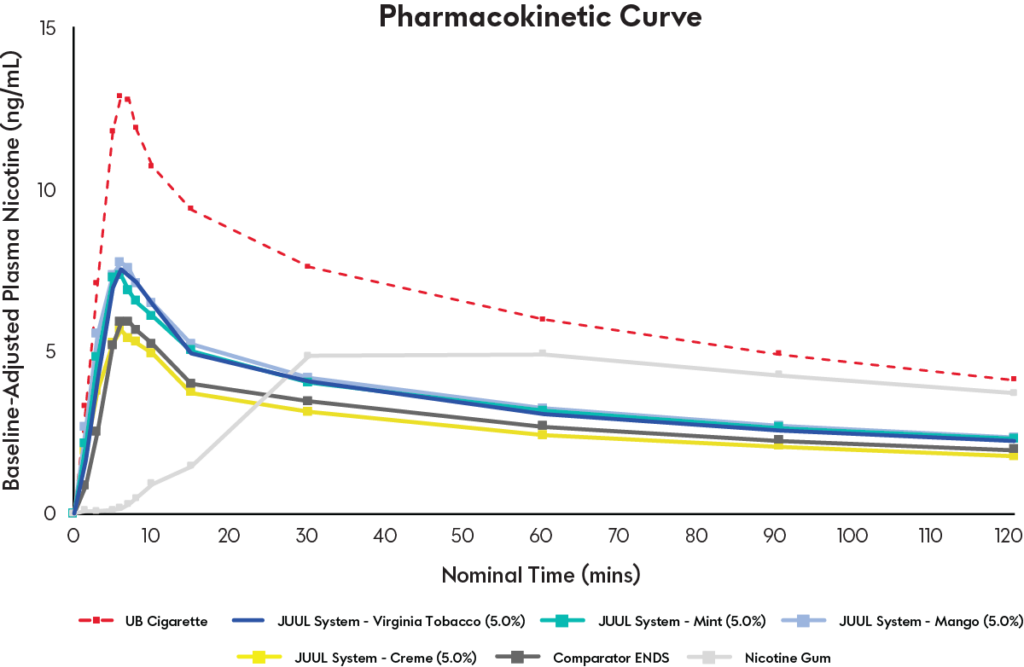JUUL SYSTEM DELIVERS NICOTINE AT SUFFICIENT LEVELS TO COMPETE WITH COMBUSTIBLE CIGARETTES, NEW STUDY SUGGESTS
Research & Analysis
November 11, 2020
A clinical study recently published in the journal Drug and Alcohol Dependence compared the nicotine delivery profile of the JUUL System with other nicotine-containing products, including cigarettes, in order to assess their pharmacokinetic or “PK” profiles. The study found that while the initial nicotine delivery for the JUUL System was similar to combustible cigarettes, the maximum and total amount of nicotine delivered was lower than that of combustible cigarettes, on par with another ENDS product, and higher than nicotine gum.
PK studies help scientists understand at what rate and at what levels various products deliver nicotine into the bloodstream. These studies are critical to understanding how nicotine alternatives and vapor products, like the JUUL System, deliver nicotine relative to combustible cigarettes.
A total of 66 adult smokers were included in the study. Each participant used seven products — their usual brand of cigarette, the JUUL System in four flavors (59 mg/ml or 5.0% nicotine concentration), a comparator e-cigarette, and nicotine gum. Blood samples were taken before and after use, and participants were asked to rate the products for satisfaction in comparison with their usual brand of cigarette.
The study authors concluded that the JUUL System may offer a sufficiently satisfying nicotine delivery alternative to combustible cigarettes for adult smokers.

Juul Labs no longer sells Mint, Mango, or Creme JUULpods in the United States. The company has submitted a Premarket Tobacco Product Application for Virginia Tobacco and Menthol JUULpods (59 mg/ml (5.0%) and 35 mg/ml (3.0%) nicotine concentrations).
“When considering laws and regulations governing nicotine, policymakers should bear in mind that providing a similar nicotine effect and experience to combustible cigarettes is critical to facilitate an adult smoker’s transition away from smoking,” said Mark Rubinstein, Vice President of Science at Juul Labs. “E-cigarettes have the potential to displace combustible cigarettes, but only if they deliver nicotine at levels to satisfy smokers.”
Juul Labs has built a robust scientific research program to help assess the harm-reduction potential of JUUL products, including their impact on the individual user, their ability to move adult smokers away from combustible cigarettes, and the net-population impact on public health. We are fully committed to the FDA’s Premarket Tobacco Product Application process in the United States.
We will continue to share results from the company’s science and research program transparently with the public health communities as we work to support the scientific basis for the category as well as future regulatory filings.
About the Study
The study, “Abuse Liability Assessment of the JUUL System in Four Flavors Relative to Combustible Cigarette, Nicotine Gum and a Comparator Electronic Nicotine Delivery System among Adult Smokers”, was conducted by Juul Labs researchers and Pinney Associates consultants and published November 8, 2020 in the journal Drug and Alcohol Dependence.
The study consisted of 66 adult smokers that completed a 7-arm within-subjects cross-over product-use study while confined to a clinical laboratory. Participants all used seven products: the JUUL System in four flavors* (Virginia Tobacco, Mango, Mint, Creme, with 5.0% or 59 mg/mL nicotine concentration), their usual brand of combustible cigarette, a comparator ENDS (VUSE Solo; 4.8% nicotine, tobacco-flavor), and mint nicotine gum (4mg) under controlled use conditions. After each product use, nicotine pharmacokinetic and subjective effects (product liking and satisfaction) were assessed.
Maximum plasma nicotine levels (Cmax-BL), rate of plasma nicotine rise, overall nicotine exposure (AUC0-60-BL), and subjective liking and satisfaction of the JUUL System were significantly lower than cigarettes. These parameters were generally greater for the JUUL System than nicotine gum; the comparator ENDS was somewhat lower but within the range of the Juul System. Nicotine pharmacokinetics did not differ among the Mint, Mango, and Virginia Tobacco JUUL System flavors. However, mentholated cigarette smokers rated the JUUL System with Virginia Tobacco flavor significantly less satisfying than smokers of non-mentholated cigarettes.
*In the United States, Juul Labs no longer sells Mint, Mango, or Creme JUULpods. The company has submitted a Premarket Tobacco Product Application for Virginia Tobacco and Menthol JUULpods with 59 mg/ml (5.0%) and 35 mg/ml (3.0%) nicotine concentrations.
Other Posts
May 18, 2021
PEER-REVIEWED STUDY COMPARES RATES OF SWITCHING AWAY FROM CIGARETTES AMONG ADULT SMOKERS WHO PURCHASED THE JUUL SYSTEM IN UNITED STATES, CANADA, AND EUROPE
A new study from Juul Labs published in the journal Nicotine & Tobacco Research found that found that while rates of complete switching from cigarettes…
April 27, 2021
JUUL LABS CHIEF REGULATORY OFFICER, JOE MURILLO, DETAILS MONOGRAPH PUBLICATION IN FOOD & DRUG LAW INSTITUTE NEWSLETTER
Juul Labs’ Chief Regulatory Officer, Joe Murillo, published a piece entitled “Juul Labs: Advancing the Scientific Dialogue About Tobacco Harm Reduction” in the Food & Drug Law Institute (FDLI) newsletter.
February 24, 2021
JUUL LABS SHARES FINDINGS FROM 11 SCIENTIFIC STUDIES AT THE 2021 ANNUAL MEETING OF THE SOCIETY FOR RESEARCH ON NICOTINE & TOBACCO
Juul Labs today announced findings from its science and research program at the 2021 Annual Meeting of the Society for Research on Nicotine & Tobacco (SRNT),…
